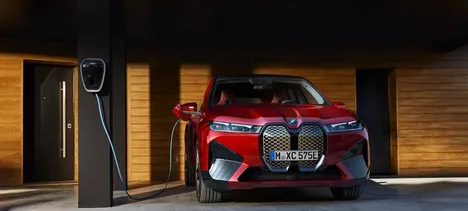Anomaly detection and prediction of charging station failure
Results of this project are explained in the final report.
- Sponsored by: BMW Group
- Project Lead: Dr. Ricardo Acevedo Cabra
- Scientific Lead: Diplom. Peter Hüsson, M.Sc. Nadine Schürmann, M.Sc. Michael Haupt
- TUM Co-Mentor: Konstantin Riedl
- Term: Winter semester 2022
Shape the future of mobility

We at BMW are strong believers in the future of electric mobility. Our goal is to reduce global emissions while providing the best driving experience for our customers!
To achieve this goal, we need our customers to enjoy their best-in-class vehicles as well as their charging experience with them. We are working on optimizing this part of our customer journey by using data driven approaches to enhance this experience.
Make a difference!
With the e-mobility ramp up around the world and the rising popularity of electric vehicles, we see a steady increase in charging sessions and therefore the need to insure the best and robust charging network for our customers. This has made charging one of the highest priorities within the BMW Group in recent years. Which is why, next to the technical aspects in the vehicle, we need to make sure, that charging providers fulfill our quality standards.
As a quality driven organization, we use the charging information from the vehicles in our fleet around the world to supervise charging quality. Therefore, we are analyzing big amounts of data to make data driven decisions. The ability to analyze huge amounts of data, structure it, understand its relationships and support better decision making makes AI a potential game-changer. Using AI driven technologies will enable faster decision making and add value to our customer experience.
About the project
This project will focus on charging session information generated by vehicles around the world combined with the information of the charging provider. Our goal is to better understand the charging experience and identify flawed charging stations. So that drivers can avoid faulty or broken charging stations. The charging session information is updated daily and will help us get a better understanding of the charging infrastructure.
The project is organized in the following steps. First, evaluating and comparing the various data sources. Understanding and optimizing historical data. Making suggestions for a use-case optimized way of analyzing and clustering the existing data. Second, training of an algorithm that will predict the future behavior and error rate of a charging station. Identifying anomalies in the data to point out problems. Third, evaluating the used models and explaining the results. Proposing ways to analyze and optimize the charging behavior based on your project findings. Students will be provided with access to the BMW big data toolchain. Data exploration and modeling will be performed in python/pyspark. We are looking for creative and self-driven candidates. Bring your ideas and make a difference in the future of e-mobility.
Accepted students to this project should attend (unless they have proven knowledge) online workshops at the LRZ from 10.10. - 14.10.22. More information will be provided to students accepted to this project.
